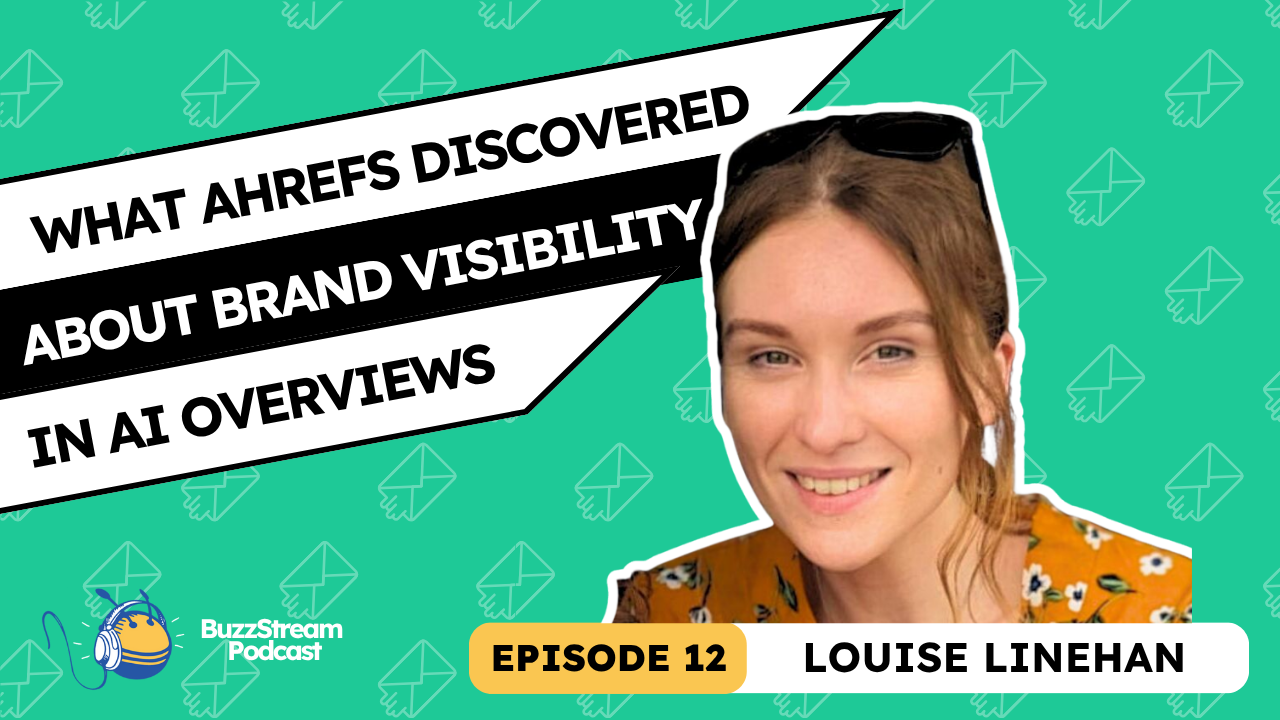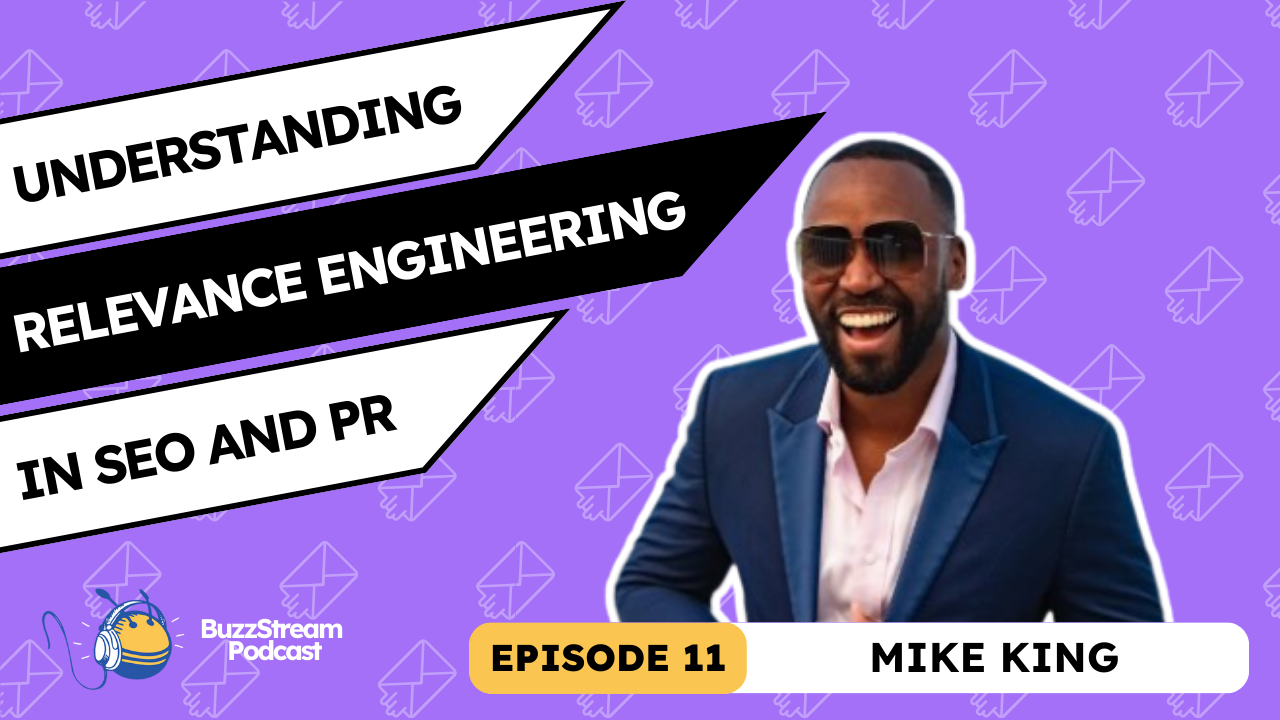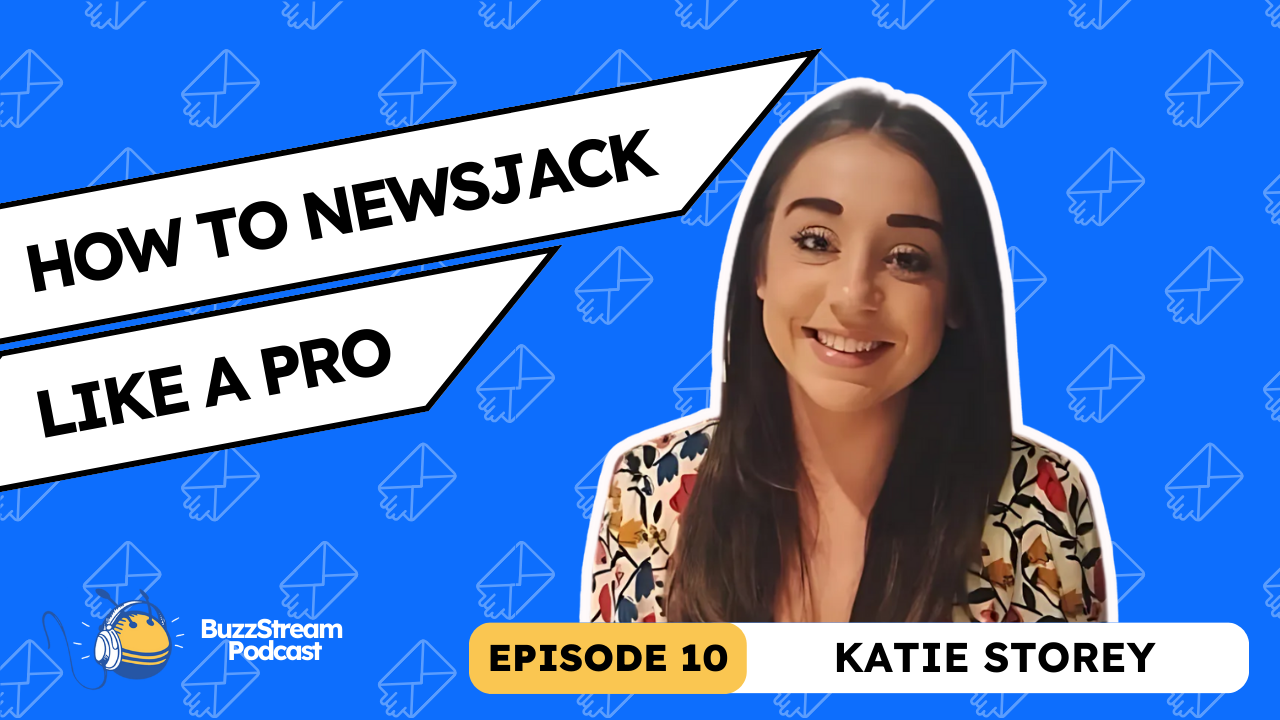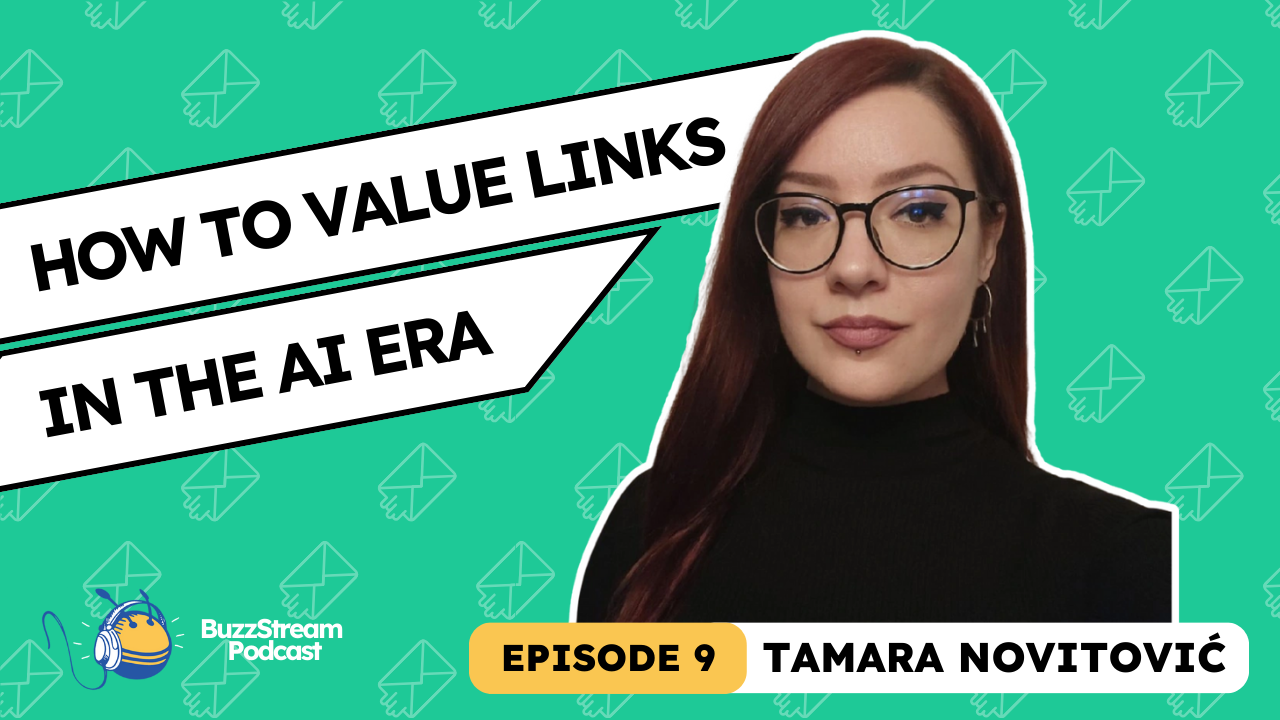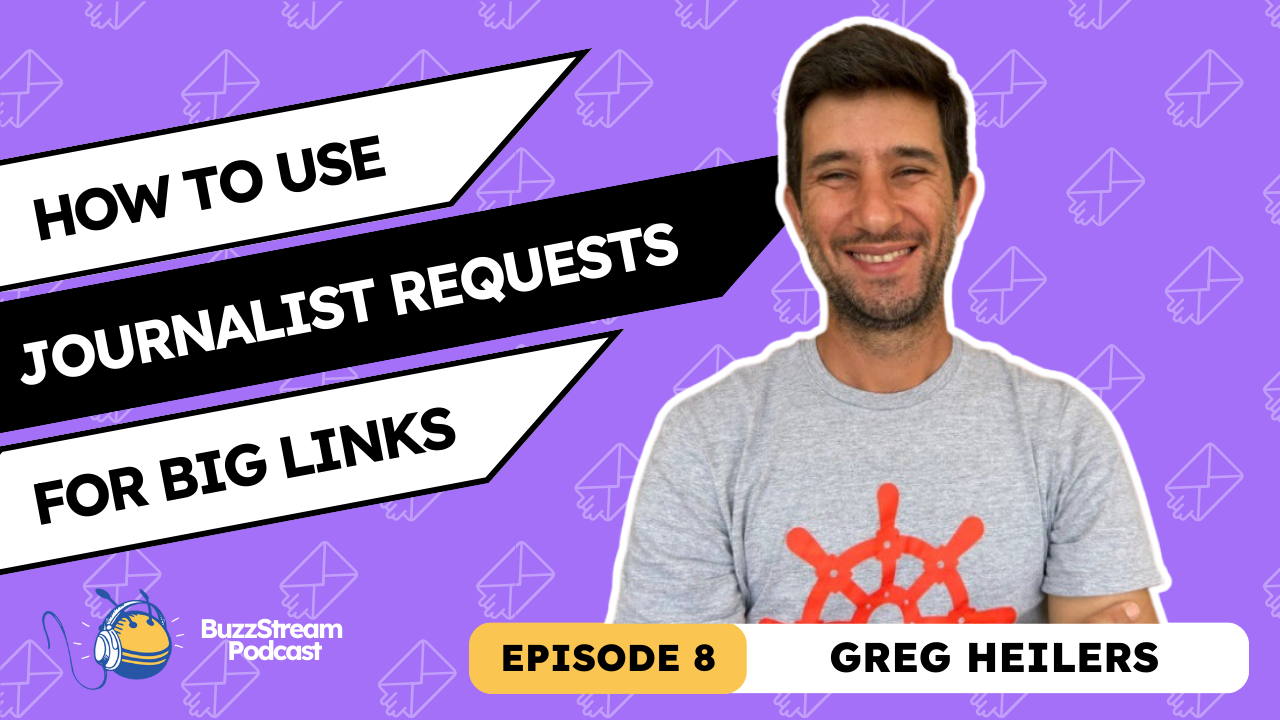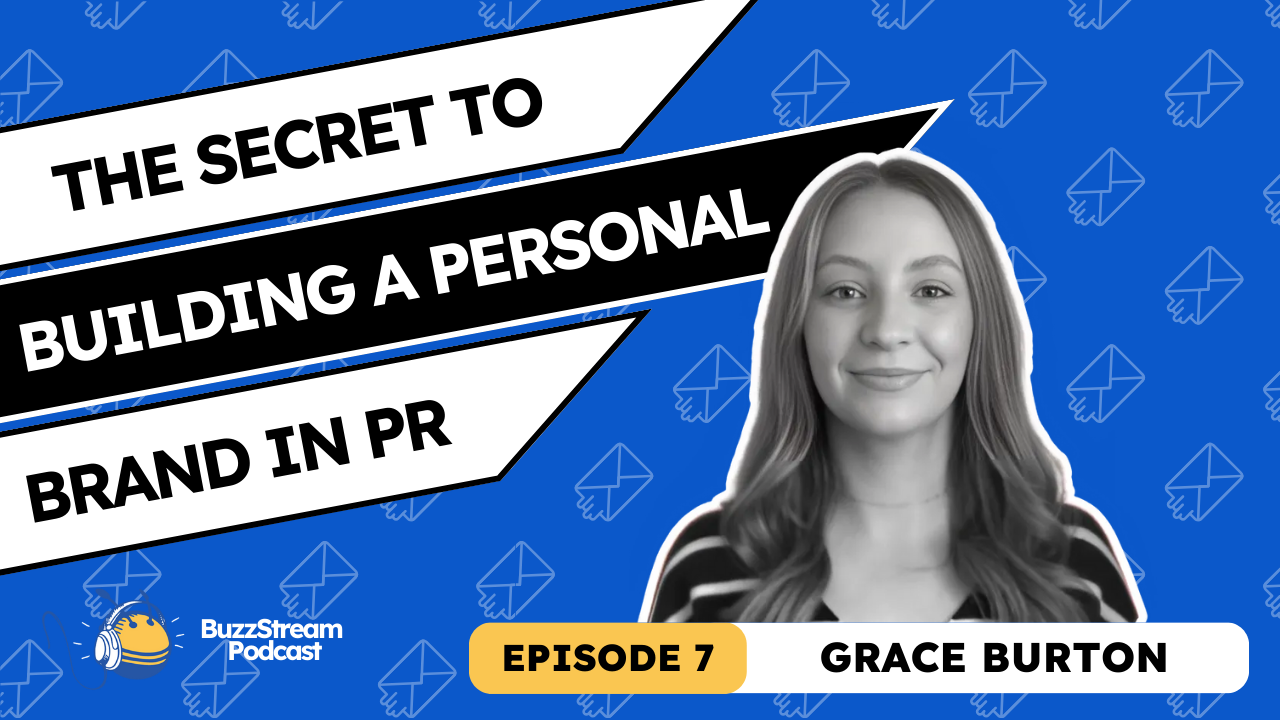Table of Contents
I met Reboot Online’s Head of Digital PR, Helena Maniglia, through Oliver Sissons, who wrote a case study for us.
In the case study, the RebootOnline team shared some fascinating insights into writing subject lines based on a study they ran.
So, I wanted to know more.
Oliver told me I needed to talk to Helena because she had put together this excellent subject-line study.
This episode is packed with great insights on ideating, iterating, and testing your subject lines to perfection.

Main Takeaways
1. Avoid Questions: Subject lines with questions have a 13% lower open rate than those without. Statements tend to perform better.
2. Be Direct and Clear: Providing a clear and direct subject line that tells the recipient exactly what they will get increases open rates.
3. Leverage Buzzwords: Using trending topics, celebrity names, or current events in subject lines significantly boosts open rates.
4. Keep It Short: Subject lines between 4 to 8 words tend to perform better, as they are concise and less likely to be cut off in email previews.
5. Avoid Overused Keywords: Common words like “data,” “study,” and “survey” don’t significantly impact open rates and can sometimes be seen as spammy.
6. Use Listicles Wisely: Listicle headlines (e.g., “Top 10 Beaches”) perform slightly better, but ensure they are relevant and compelling.
7. Personalization Matters: Personalizing subject lines based on the recipient’s preferences and writing style can increase engagement.
8. Mobile-Friendly: Shorter subject lines are more user-friendly for mobile devices, ensuring they are not cut off.
9. Build Relationships: Focus on building long-term relationships with journalists by being transparent and avoiding deceptive tactics like fake “RE” or “FWD” tags.
10. Test and Iterate: Experiment with different subject lines and analyze what works best for your audience, refining your approach over time.
Resources Mentioned
Note: below is the slightly-edited transcription.
Can you lay out the methodology for your study?
Yes, sure. The methodology we used is analyzing over a thousand subject lines targeting a variety of topics. Our aim was to identify the ideal headline length and the type and styles of headlines that are most likely to grab journalists’ attention.
We analyzed the headlines into four groups and wanted to compare their open rates.
So the four categories were:
- Interrogative: so the type of headlines that end with a question mark,
- Research-based headlines: headlines that start with keywords such as data, study, research, things that show the journalist that the story we’re trying to give them is based on data research.
- Listicle headlines: those headlines that are, that organize the results of the study by, uh, rankings or lists.
- Buzzwords: headlines that include current events, any trends or celebrity names, and things that are happening at the moment and will grab journalists’ attention.
We analyzed this and compared the open rates between them to see what does well and what doesn’t and what tends to increase open rates and what doesn’t.
Are those headline types primarily what you all send at Reboot?
Uh, yes, I would say not only those, we do different other types of headlines, but we felt that categorizing by this would be good to kind of have a better idea of open rates.
What industries did you send to?
Yes, we, because we actually analyzed, uh, the headlines that we, uh, used in a specific amount of time. We included a variety of topics. So, from property, sector, lifestyle, and travel industry to motor, finance, and entertainment. So it was quite a big pull.
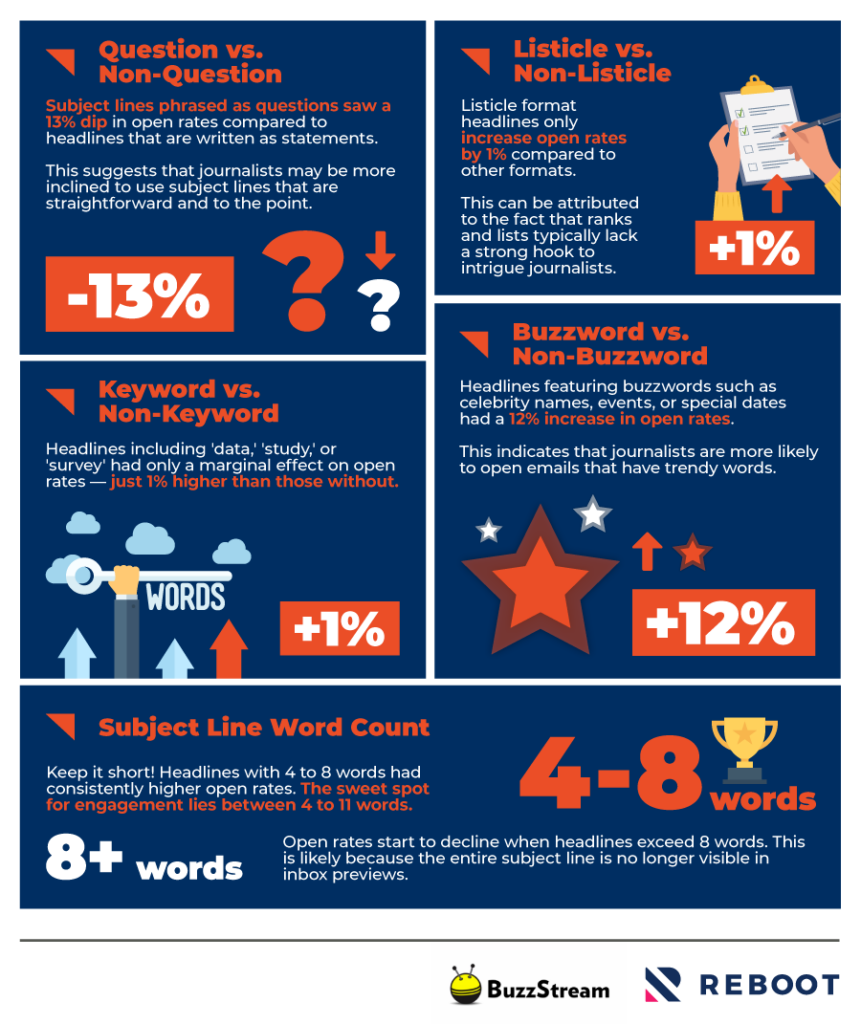
Why do you think subject lines with questions have had a 13 percent lower open rate than headlines without questions?
Yeah, we found that interesting because it shows how headlines with questions are quite predictable and ambiguous.
So I think predictable in a way that, uh, you’re kind of asking the journalist for a response. You’re not actually giving them what they need. You’re asking for information. So, I think that this can potentially lead journalists to just skip opening the email because they already know the answer. So it’s pretty predictable.
You’re not actually giving them the data.
Could you give us an example of a question subject line?
Yes. An excellent example of a question in a headline, which we even gave in the blog post on BuzzFeed, is why Plymouth is the most haunted place in Britain.
So it’s a headline we used that didn’t get as many open rates as we had when we actually said Plymouth is the most haunted place in Britain or is amongst the most haunted places.
This is because we’re giving the journalist a sentence that we are actually, we know the answer, whereas the other one, you’re kind of requesting the journalist to think of reasons why, if that makes sense.
Yeah. I recall us having a rule at Siege where it was like, if that journalist could answer the question, no. Like that would get them to not open the email, you know, like, that’s not a good type of question. So if it was like, is Plymouth the most haunted place, if they knew right off the bat, like, yes or no. Then they’re, they’re just going to click through it, right?
Yeah, we say a lot at Reboot that there’s always the so what that we have to think about when, uh, not only in head, in subject lines, but also like the hook of the story that we’re doing or even like, um, the type of data we are searching. Uh, to get our data team, our, uh, data team is actually trying to find, we’re always trying to think about the, so what, so what we’re giving to the journalists is a, so what kind of a story or headline that they will look and say, not really interesting.
It’s not giving me anything.
So, if I were writing a post about, say, the 10 best beaches in the UK, what would a subject line question be?
The top 10 beaches you said in the UK are beaches. I think, like looking at our study, you can apply them four to the four categories that we analyzed. So we could look at, for example, no question mark and avoid maybe saying data or survey.
So it would be probably something more tailored to the region. So for example, go to the region that come up on top or the city that come up on top and say, X is the best, has the best beach in the UK.
It’s really important to understand the journalist you’re reaching out to when thinking about subject lines.
Analyze the type of subject lines and headlines they use in their articles and also the website and outlet. So, how does this outlet tend to be more positive or negative about the topic of your study?
You can approach that in the same language as they use because this will help the journalist feel familiar. The journalist is going to look at their inbox and actually see something they’re familiar with and they know. So this is really important.
Why do you think open rates weren’t impacted by subject lines with keywords like data, study or survey?
I remember the difference not being very significant. But I feel that it’s because of overused keywords. First of all, these keywords have become very common subject lines. So if many emails that the journalists receive use this keyword, they may not, and your study won’t stand out enough to actually increase the open rates.
And I think that even if important words like data study are there, uh, at the beginning, maybe the best part of your study, the actual hook is at the end. This means that depending on the length of your subject line, it’s going to cut off.
So the journalist will actually see data reveals or survey reveals, but won’t see the rest.
Did you test anything like including the word “exclusive”?
Yeah. Journalists are always searching for exclusives—not all of them, but they are always trying to find a more unique story. So yeah, they do make the difference. We’ve never done any study on this. Uh, so I don’t have data to back up, but I think speaking from personal experience really helps.
And I think it is a good way as well to start building relationships with journalists as well, because when you offer exclusive, you’re, uh, you’re starting there a connection that you could benefit from later on and they will benefit as well.
Are there any other keywords besides “survey” or “data” that people should avoid?
Um, I think it really depends on the study, isn’t it? But I do feel that it is more of what you want. There are always spam keywords as well; words that the mail server will see as spam and won’t actually deliver will go to the spam folder, so this is something to be mindful of as well.
So, this is something quite good that can help. We constantly try to find and avoid them because they can lower the open rates.
Yeah, sometimes not even words, but how you write the press release. For example, if there are too many uppercase, it can go to spam. Not all cases, obviously, but things to consider when writing.
Can you clarify what you mean by a listicle subject line?
Yeah, we call them listicle headlines that have this type of ranking or list. For example, the top 10 beaches to visit in the UK, the 10 worst TV series finales, or the five best coffee shops in London—this type of list is something we’re quite used to seeing online. So, this is the type of headline that we call a listicle.
Interestingly, there wasn’t a huge difference as well. The open rates were just 1 percent above. But I think that, again, this type of headline can be predictable depending on who you’re sending it to. I think all of the subject lines are pretty relative. It depends on who you’re sending to and the context of your story.
But before, this type of headline can fall in the place of being pretty predictable because it makes the recipient feel like they already know what to expect. But if you give the hook, for example, as I was saying, the X beach, the banks, uh, Y beach in the UK, for example, this already gives the hook, even though it kind of shows that you have a listicle style of content, if that makes sense.
Why do you think buzzwords helped open rates?
Yeah, it’s funny. This one wasn’t a surprise when we saw the results. I think it’s because obviously, the news cycle is always urgent, so journalists are trying to find things that resonate with their audience.
But it’s also timely. It’s happening at the moment, so trends, any celebrities that are in the, in the news at the moment, they’re doing something relevant, or, uh, even like special dates, Valentine’s Day, Easter, summertime, for example.
So, any of these words that people are talking about are what journalists want to write about because they are relevant to their audience.
So I think that’s the main reason why this type of headline does well.
I think it’s also being smart enough in the way you phrase the headline again, trying to always find the hook that links to that specific buzzword to actually make it relevant in your study.
It’s not only the buzzword that makes it relevant; it’s also finding that hook in your study that will be relevant and give the journalist something new to talk about that person.
Because people or specific dates are in the news. They’re overly shared; there is so much content about them that you have to find a unique angle that will add value to what you’re doing.
Using our beaches example are you saying it would make sense to try to find some type of event or buzzword that you can kind of tie that to?
Yeah. Exactly that. Yes. I think, I think the beach one is an excellent example for summertime, for instance. It’s an excellent way to tie both. We did one recently, a reboot that was about Taylor Swift. Obviously, she’s everywhere, and her tour was everywhere as well, with people trying to buy tickets. And there were a lot of scams in the news.
We decided to do a study on tips to avoid being scammed when buying Taylor Swift tickets.
So we used the relevant keyword there, Taylor Swift, but added a unique angle that was tied into what was happening in the news, and it did really well.
Is it better to tie these keywords or buzzwords in the ideation stage, or do you find it doesn’t really matter?
Different people have different ways of doing it, but I would say that, at least personally, I find that it is a constant process.
So, first, obviously, when you’re developing your strategy and have your campaign idea in mind, you will search for keywords related to your campaign. Then, you will go online and see how the media reacts to this topic.
They will use headlines differently. So it’s good for you to have this knowledge before even writing the press release just when you’re doing your research and ensuring that the keywords that you’re using in your study are accurate.
It’s a constant process because then, when you write the press release, you can revisit it again.
Is there something else you clicked on when writing that you can add to your subject line?
So we tend to do exclusives as well, but not always.
You could contact the journalist when you know what you want to do in the study.
For example, in our case, sometimes, uh, it is extensive data sets. So we want to make sure that this is actually like we’re giving, we’re analyzing the best metrics to actually create that story.
So reach out to journalists and ask like, uh, have this study that we are working on. Uh, is that something that is of interest to you?
While we’re searching for something in a study like that, having that feedback early on so you can build up, and I think the subject lines are similar.
You can try it out with the feeler emails.
What subject line do you use for a feeler email?
In this case, yeah, you can either go with an exclusive and say, look, we are doing this. If it is of interest to you, we can give you an exclusive.
You could put the exclusive in the subject line, or you can add “upcoming study” as well. For example, an upcoming study on UK beaches. Something like that gives the journalists an idea of what we are going to talk about.
Subject lines need to be clear of what you are delivering, and I think given this, yeah, there are specific words that they’re going to look at, and they were writing to know what it was about. It’s the key.
Do you recommend brainstorming lots of potential subject lines before choosing the best?
Yes, definitely. With digital PR, it’s about trying out different headlines and comparing industries, countries, and different journalists. It’s about seeing what works and then always trying to improve and use the one that stands out the most.
At Reboot, we work very collaboratively, so we always try to help each other with this as well. We always write different headline options that we think are relevant for that specific sector and always ask each other what we believe works or not.
Is that in Slack or do you have a formalized process?
Yeah, it’s on Slack, so it depends if you can do it with your team or company-wide. We tend to do this because we already have a feel of what will grab the most attention from journalists, but I think every person has a different way of doing it as well.
A/B tests work well also.
Again, I think that is always trying to improve from what you kind of learned in the beginning.
Can you expand on what it means to tailor the headline to a journalist?
What I am trying to say is that journalists have different ways of using headlines and approaching topics.
So, I think it’s important to keep this in mind when you’re writing and actually reaching out to the journalist about your study.
I feel that researching journalists’ preferences, writing style, what they like to cover, and how they cover that will help your subject line be more relevant than others when they’re actually going through their email inbox, if that makes sense.
I think some journalists will obviously have stronger opinions about something.
Regional journalists, for instance, will obviously come from sometimes the region they’re writing about. So they will be more protective about the results of this study than like any other person.
How far do you get into personalizing per journalist?
I think that’s a huge part of what we do, actually.
We try to personalize emails as much as we can, making sure that we know who we are reaching out to.
I think that this is important because sometimes we forget that we are building relationships with this journalist.
This starts very early on when you write your subject line and ensure it is relevant to that person.
It’s essential to understand that journalists are very busy people, and we must also respect their time.
We need to respect their preferences.
Obviously now emails are the biggest preference but it could be even the time you reach out to them. Not not all of them will work five days a week.
So I think we should do everything we can to make their lives easier. This is what we want, and it ensures that they know that on the other side here, we know who they are.
So, when you’re talking about personalization, it sounds like you are talking more about understanding the journalist’s preferences or beat rather than calling out an article. Is that right?
No, I think you can do both. We talk a lot about writing personalized emails to journalists. But I feel that personalization comes from this strategy of knowing who you’re reaching out to and understanding how they write.
I think it’s a combination of everything.
Do you feel like there’s ever a time when you should definitely personalize vs not?
I have encountered these two types. Some journalists say that they don’t like it and prefer a straightforward email. I think you can do both; it depends on the journalist, and that’s why it’s so important to understand the person who’s behind it.
Journalists quite like to know that you’re researching about them.
It takes a long time to personalize every email. Are there tips that you have for speeding that up and finding out the information that you need?**
I think BuzzStream is a good one. There are various ways to personalize the emails on BuzzStream, which we find are very useful.
I feel that our job is to make their lives easier and build these relationships.
I find that it will save me more time if I have a good relationship with journalists.
I will have them in mind when I write press releases. Then I’ll write to them or ask them if this is something that interests them.
Would you like to receive this? It guarantees a link without much effort. I know what they like and what is relevant to them. I personally used that strategy when I did a lot of digital PR campaigns, and it worked well for me.
Buzzstream is a good way to personalize emails, but I always do feel that bulk send is something that we cannot do and we should avoid as much as we can.
You can build good results and get links without doing this.
So, I prefer the personalized email.
Why is the subject line word length so important? And then what kind of tips do you have for cutting out some words?
Four words is tricky. I think it’s just, I think maybe for content, everybody loves to try things. We tried to see if it worked. And, yes, I think that’s where this four word headline comes from.
We tend to use between eight and 11. I think that’s kind of the best practice, at least for me. Shorter headlines help us be concise and clear and also help us look at the strategy part of it.
It helps that it’s more user-friendly for mobile as well, and it helps that you don’t cut off when you’re in an email inbox.
So it’s just a little bit of a strategy, and it shows that it works. The shorter ones have higher open rates.
So I think it’s just avoiding extremes. Going over, I would say, 12, 13 words or going too low, like, four words.
Any final thoughts on the study?
Something I would say again is that I think everyone has different ways to do this.
Apart from the buzzword one, as you said, there are no very significant ones.
So I think, again, it goes down to what we were saying: It depends on who you were reaching out to.
So I think knowing, knowing the person that you’re sending your email to and researching about the journalist is better and more strategic.
Did you ever experiment with putting the website name in the subject line?
I’ve never tried myself, no.
Looking at the findings and the analysis we did, it could come down to familiarity.
Maybe that’s why adding a website name in the subject line works so well: the journalist will recognize it as a familiar name.
So it brings that and, uh, yeah, it makes the email show appear more trustworthy or even more relevant to them.
I’ve seen people recommend using RE: or FWD: in an initial email to make it appear like you’ve had a conversation already when you haven’t. How do you feel about that?
We tend to take the long-term route. I think, personally, this may result in short-term results that will increase maybe open rates and even lead to coverage. But it’s not sustainable.
From my point of view, the FWD or RE approach kind of compromises the relationship we are trying to build with journalists and makes them not see you as a trustworthy source.
At Reboot Online, we tend to follow the more complex and longer route, which is pro-journalist and prioritizes transparency with them.
And I think this lays the groundwork for lasting collaborations with them and ultimately also contributes to our clients’ positive reputations. If they see us as a trustworthy source, they see our clients as a trustworthy source as well.

 End-to-end outreach workflow
End-to-end outreach workflow



 Check out the BuzzStream Podcast
Check out the BuzzStream Podcast

